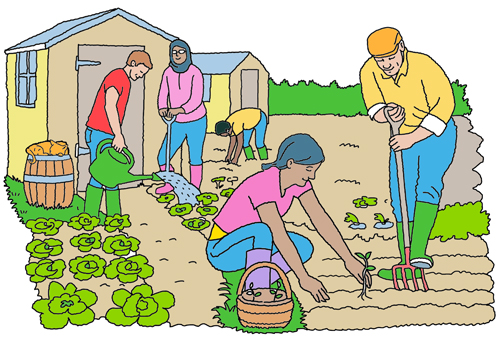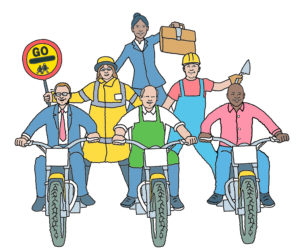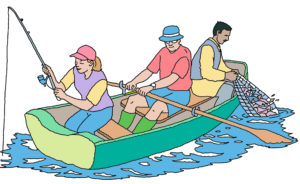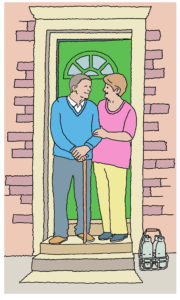Preparing the ground for a stronger local democracy
On Friday 30th June 2017 we published our landmark report, “Growing a stronger local democracy, from the ground up.” This is the Executive Summary from our report.

We want to create the conditions in which local democracy will thrive. This means starting with our citizens and with our sense of local identity – with the ground beneath our feet.
Every good gardener understands the value of co-operation. You need to know your own ground well enough to be able to get along with it. Local democracy can only happen where we are. It’s about the relationships between people in the places that we feel we belong.
So our work began, and will continue, with listening to our citizens. We have unearthed a strong enthusiasm for civic society – people want to have a real stake in the places where we live and work. It is fertile ground, but not necessarily stone-free or level. People have shared their frustrations about how difficult it can be to find information, to understand how things work, and to feel that we have a genuine choice.
We have now heard from over 1,000 people about what local democracy should be like. We’ve gathered a huge amount of evidence and we can learn much from those who have sown the seeds of a different kind of local democracy elsewhere. Our recommendations are the beginnings of the stronger local democracy that we intend to grow.
Active citizens
 We’re aiming to redesign local democracy for the future and we’re strongly aware of the responsibility that we have to our young citizens. We want to develop an environment and a culture that nurtures young people’s interest in local democracy. This is important as young people currently don’t have as much of a stake in civic life, for many reasons.
We’re aiming to redesign local democracy for the future and we’re strongly aware of the responsibility that we have to our young citizens. We want to develop an environment and a culture that nurtures young people’s interest in local democracy. This is important as young people currently don’t have as much of a stake in civic life, for many reasons.
However, we also heard clearly from our citizens that people of all ages want (and need) civic and political awareness. Local democracy is unfamiliar territory for many. Citizens told us that the only way you can get involved is by understanding how local democracy works. We need to do more to explain local democracy and to develop a life-long approach to citizenship for everyone. Our schools are a good place to make a start.
If we are serious about encouraging active citizens, our democratic content must improve – it must be shareable, interesting and accessible, so that it is of value and relevance to our citizens. We need to think about the explanations we provide, the media we employ, the language we use and the ways in which we share.
Networked society
 Living in a networked society offers many opportunities for strengthening citizenship. Digital technologies enable ordinary citizens to get their voices heard where others may have dominated in the past. Citizens are already using the internet as a place to collaborate and network for civic good. Our local democracy can feel very out of step. We need online spaces that are designed for citizens – not customers.
Living in a networked society offers many opportunities for strengthening citizenship. Digital technologies enable ordinary citizens to get their voices heard where others may have dominated in the past. Citizens are already using the internet as a place to collaborate and network for civic good. Our local democracy can feel very out of step. We need online spaces that are designed for citizens – not customers.
Networked citizenship is about local communities, social organisations and businesses working together, to create social good through collaboration.
Civic society is wide and we want everyone to play an active part – great places develop from strong relationships. To get the best from digital technologies, we all need to be connected so that we can be part of the civic conversation. We have a shared responsibility for digital literacy. It’s important for citizens and councillors alike to have the skills and confidence to be active online.
Councillors
 Our citizens value the role of councillor, although many don’t fully understand what councillors do. It’s clear that citizens want more direct contact with local decision makers. We need to help citizens understand this changing and challenging role, and to encourage more people to come forward and stand as councillors.
Our citizens value the role of councillor, although many don’t fully understand what councillors do. It’s clear that citizens want more direct contact with local decision makers. We need to help citizens understand this changing and challenging role, and to encourage more people to come forward and stand as councillors.
We need to build trust and show how being a councillor can enrich a person’s life, and how councillors can enrich our local communities.
Decision-making
 We need to have a much stronger focus on genuine dialogue and engagement as part of our changing relationship with citizens and communities across Kirklees. Consultation is not currently enabling active citizens – in fact, it appears to be having the opposite effect. Our citizens want to be part of an ongoing conversation, not stop-start consultation.
We need to have a much stronger focus on genuine dialogue and engagement as part of our changing relationship with citizens and communities across Kirklees. Consultation is not currently enabling active citizens – in fact, it appears to be having the opposite effect. Our citizens want to be part of an ongoing conversation, not stop-start consultation.
We’ve heard that it’s important to give people information throughout the decision-making process. Citizens find this valuable, whether or not they personally agree with the final decision. Democracy isn’t about always being the person who wins – but it is about being part of something and feeling that you have a voice. We need to share more information about how decisions are made, and not just what those decisions are.
Elections
 Democracy isn’t just about voting, but greater participation in local elections should be one of the features of a strong and healthy local democracy.
Democracy isn’t just about voting, but greater participation in local elections should be one of the features of a strong and healthy local democracy.
Voters are motivated by having a competitive choice of candidates and by feeling that their vote really matters.
Citizens told us that it’s important to get the best people into the council, and you don’t hear enough about who your candidates are and what they stand for.
Local government touches every aspect of our day-to-day lives, and yet most people do not see local elections as important. We must do more to tell the story of why local democracy matters. We need to improve people’s understanding of the local political system and its importance. We also recognise that the practical aspects of running elections are becoming more challenging. The number and type of elections is growing, as are voter expectations for making the process easier and more flexible.
Regional devolution
 Regional devolution is an ongoing journey with a future that is as yet unclear. We’re focusing on what we can do in Kirklees to make the most of the opportunities. We believe that we should start with the local and evolve our regional democracy from there.
Regional devolution is an ongoing journey with a future that is as yet unclear. We’re focusing on what we can do in Kirklees to make the most of the opportunities. We believe that we should start with the local and evolve our regional democracy from there.
We need the different levels of our democracy (from neighbourhoods to towns, districts, regions and national government) to connect. What does our democratic “family tree” look like? It’s not easy for citizens to understand those relationships.
It should be clear who has responsibility for which decisions, how citizens can get involved, and how we can hold decision-makers to account.
 Different things grow well in different conditions, and we want to work with our citizens and others to discover what approaches will work well in our local democratic environment. This means trying out practical projects, on a local level, and talking openly about what has (or hasn’t) been productive – and why.
Different things grow well in different conditions, and we want to work with our citizens and others to discover what approaches will work well in our local democratic environment. This means trying out practical projects, on a local level, and talking openly about what has (or hasn’t) been productive – and why.
Our witnesses have shared lots of inspiring examples of ideas that have already been tried in other towns and in other countries. Our citizens have come up with new ideas of their own. We are looking forwards to working together and finding out which of these ideas will take root in our Northern climate.
We will continue to listen to local knowledge and experiences throughout our practical work, and we hope to grow new and stronger relationships as we bring our ideas to life.
In this way, we will grow a stronger local democracy – from the ground up.
Our report
2 thoughts on “Preparing the ground for a stronger local democracy”
13 years ago we were writing about citizenship in schools: I go authored the first systematic review on that which can be found here https://eppi.ioe.ac.uk/cms/Default.aspx?tabid=127
My challenge to councils and all public sector agencies is when will you think deeply about what this means for you and civic society in terms of investment in solid engagement to co design, co produce, and co deliver? You say people don’t want consultation because it’s stop/start but sometimes consultation is the right thing to do – a formal need to seek input on limited options. But the way consultations are carried out impact on citizen perception of involvement, blaming consultation and not the people carrying it out. My point is if the very people who serve us (public servants) don’t engage effectively then engagement and active citizenship will suffer the same negative associations as consultation often does.
Hello. Thanks for the link. We’re always interested in learning from previous work and will continue to make use of anything we learn as we begin work on delivering our recommendations.
You can find more information about what our citizens and witnesses told us about consultation in our full report, and in the evidence from our public engagement events.
Our report:
http://www.democracycommission.org.uk/growing-a-stronger-local-democracy-from-the-ground-up/
Our evidence:
http://www.democracycommission.org.uk/our-evidence/
(Local democracy roadshows)
We’ve shared 48 recommendations for how we can grow a stronger local democracy. The need for us to have genuine engagement and dialogue between citizens, public servants and others is featured strongly in our report.